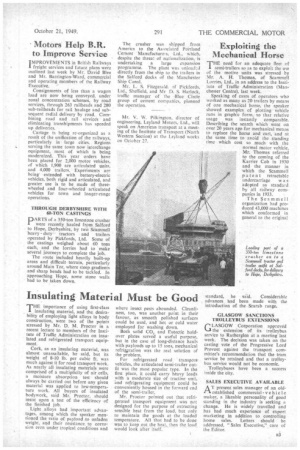Insulating Material Must be Good
Page 37

If you've noticed an error in this article please click here to report it so we can fix it.
THE importance of using first-class
insulating material, and the desirability of employing light alloys in body construction, were two of the points stressed by Mr. D. M. Proctor in a recent lecture to members of the Institute of Traffic Administration on insulated and refrigerated transport equipment.
Cork, as an insulating material, was almost unassailable, he said, but its weight of 8-10 lb. per cubic ft. was much against it for road transport work. As nearly all insulating materials were comprised of a multiplicity of air cells, a moisture absorption test should always be carried out before any given material was applied to low-temperature work. All buyers of insulated bodywork, said Mr. Proctor, should insist upon a test of the efficiency of the finished job.
Light alloys had important advantages, among which the speaker mentioned the ratio of payload .to unladen weight, and their resistance to corrosion even under tropical conditions and
where insect pests abounded. Cleanliness, too, was another point in their favour, as smooth polished surfaces could be used, and hot or cold water employed for washing down.
Both solid CO, and Eutectic holdover plates served a useful purpose, but in the case of long-distance hauls with payloads up to 15 tons, mechanical refrivration was the real solution of the problem.
For refrigerated road transom* vehicles, the articulated semi-trailer outfit was the most popular type. In the first place, it could .carry heavy loads with a moderate size of tractive unit, and refrigerating equipment could be conveniently housed in the forward end of the semi-trailer.
Mr. Proctor pointed out that refrigerated transport equipment was not designed for the purpose of extracting sensible heat from the load, but only to maintain the goods at the loaded temperature. All that had to be done was to keep out the heat, then the load would took after itself. standard, he sa'id. Considerable advances had been made with the introduction of the Scarab range.
GLASGOW SANCTIONS TROLLEYBUS EXTENSIONS
GLASGOW Corporation approved the extension of its trolleybus service to Rutherglen at a meeting last week. The decision was taken on the casting vote of the Progressive Lord Provost against the transport committee's recommendation that the tram service be retained and that a trolleybus service would not be economic.
Trolleybuses have been a success inside the city.
SALES EXECUTIVE AVAILABLE
I-1 A T present sales manager of an oldestablished commercial -vehicle maker, a likeable personality of good standing in the industry is seeking a change. He is widely travelled and has had much experience of export marketing in addition to controlling home sales. Letters should be addressed, "Sales Executive," care of the Editor.




























































































